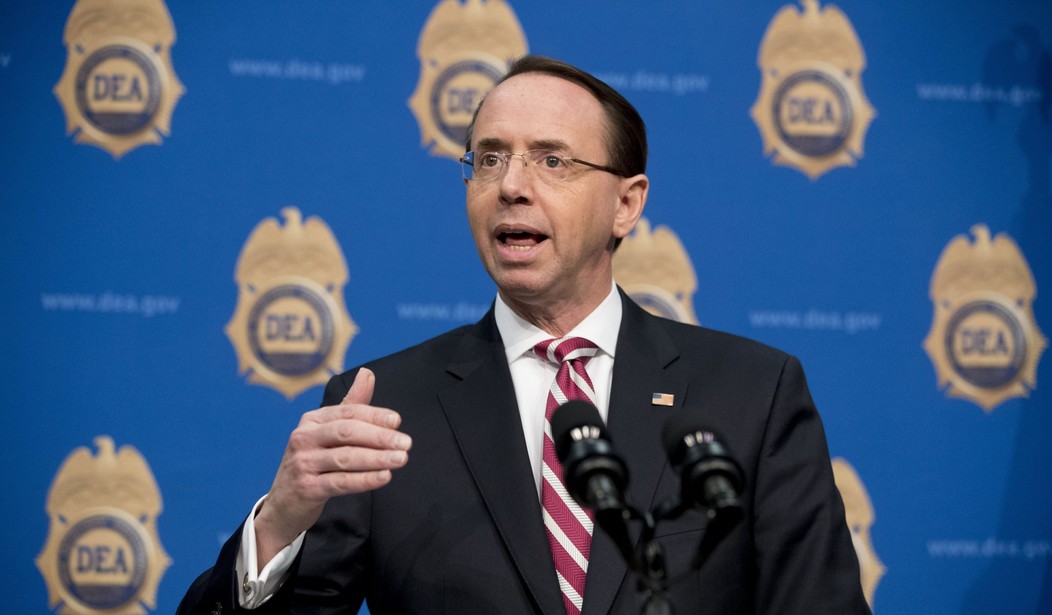Deputy Attorney General Rod Rosenstein, who is expected to retire next month, said today that he “kept the faith” despite “more than my fair share of criticism” while in office.
Speaking in Philadelphia at the Wharton School’s Legal Studies and Business Ethics Lecture Series, Rosenstein reminded the University of Pennsylvania students that “you are relentlessly bombarded with information, much of it of unknown reliability.”
“The internet lets people share their most ignorant thoughts. Many news stories rely on anonymous sources, without providing details to assess their credibility and bias. Some critics worry that our society will be unable to distinguish fact from opinion, and truth from fiction,” he said. “But I remain optimistic about your generation. Most adults were raised with the mindset that they could rely on one or two trusted intermediaries to deliver objective facts – a local newspaper, perhaps, and a favorite television news anchor.”
“But members of your generation take a different approach. You do not rely on any one news source. You recognize that some people who appear regularly on television – the ones who always form an opinion before they know the facts – those characters are in the entertainment business. Because you understand that, you are more skeptical, and less gullible.”
Rosenstein added that even though “almost everyone is obsessed with breaking news” in D.C. his office television is not plugged in.
“I try not to worry too much about what a commentator may say in the next 30 minutes. Instead, our law enforcement team focuses on what it takes to keep America safe for the next 30 years, and beyond,” he said. “…I have worked with law enforcement professionals for three decades. Some of them do the job for the money, but most are inspired by the realization that they are the government, a calling that we recognize as patriotism. At the Department of Justice, our patriotic mission is to promote the rule of law.”
The DOJ No. 2 stressed that “when you follow the law, it does not always yield the outcome you would choose.”
“In fact, one indicator that you are following the law is when you respect a result although you do not agree with it,” he said. “You respect it because it is dictated by the facts and the law.”
Rosenstein told the business students that “technological developments pose significant law enforcement challenges, because people who create and market new tools often do not consider the implications for public safety.”
“Electronic devices collect and transmit tremendous amounts of information about their customers. Many users do not understand that the companies use that data for commercial advantage. And all users are vulnerable when hackers steal data,” he said. “Then there are social media platforms, which provide unprecedented opportunities for the free exchange of ideas. But many people do not realize how they are exploited by malicious actors who deceive them.”
“Soon, we will need to come to terms with ‘deep fake’ videos, which may defeat our ability to rely on things that we see and hear directly. The speed and volume of technological advances exceeds the capacity of most people to comprehend the risks, let alone to protect against them.”
Upholding the law, Rosenstein said, “is not the job of government alone” but “depends on countless decisions citizens make as they go about their lives.”
“That is why it is so difficult to reform corrupt foreign governments. You cannot just adopt a Constitution. It only works in tandem with a culture of honesty, fairness, and integrity,” he said.
Rosenstein said that his “time as a law enforcement official is coming to an end — a lot later than I expected.”
“People joke about the revolving door between government and the private sector. The door never revolved for me. It was one way in, and one way out,” he said.
“In 1940, Attorney General Robert Jackson explained that government lawyers ‘must at times risk ourselves and our records to defend our legal processes from discredit, and to maintain a dispassionate, disinterested, and impartial enforcement of the law,’ even if it requires us to incur criticism,” the deputy attorney general added. “I took more than my fair share of criticism. But I kept the faith, I followed the rules, and I left my office in good hands. Those are the things that matter.”








Join the conversation as a VIP Member